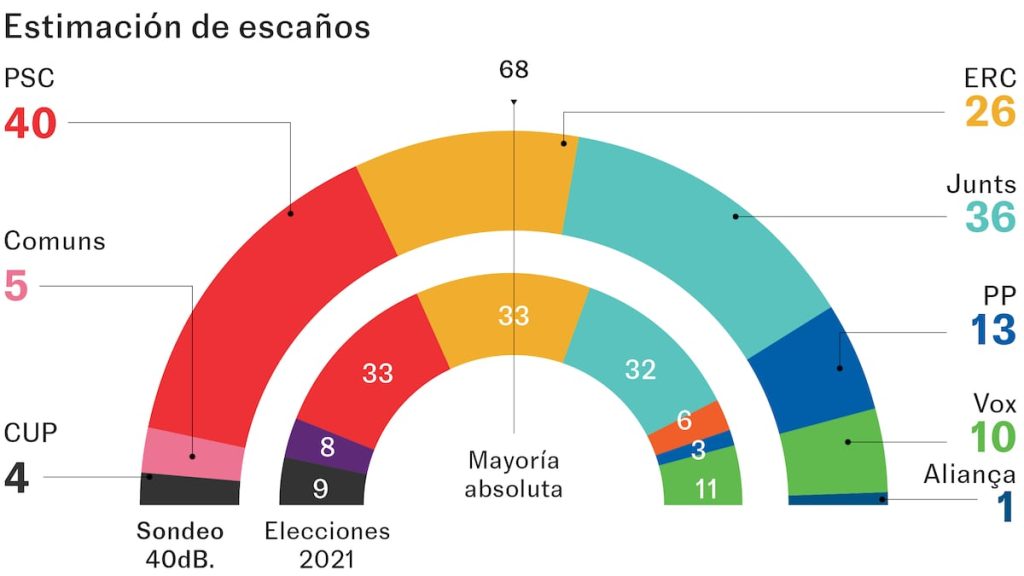The turbulent political life in Catalonia may be on the verge of experiencing another episode that has been difficult to imagine during the years of the procés and has not been seen for four decades. For the first time, nationalist forces – now all converted to the independence movement – could find themselves in the minority in the Catalan Parliament by not achieving the minimum of 68 seats out of 135 that has allowed them to govern uninterruptedly, albeit under different formulas, for the past 13 years. The push of the Partit dels Socialistes (PSC), led by Salvador Illa, along with a strong rise of the PP, may leave the independence movement without the absolute majority that would allow them to block any government that is not pro-independence.
The PSC is expected to win the upcoming elections on Sunday, with Junts following closely behind and Esquerra Republicana dropping to third place. Despite Illa’s victory – which would consolidate him in the top position with 40 seats – the socialists do not have a guaranteed chance at the presidency of the Generalitat. Coalitions involving two or three parties will decide in a scenario where the risk of a deadlock and even a repeat of the elections still looms large.
A recent poll by 40dB for EL PAÍS and SER, less than a week before the election, shows a clear victory for the socialists, who would reach 40 seats in a Parliament where the absolute majority is set at 68 seats. The socialists continue to rise after the turmoil caused by the President of the Government, Pedro Sánchez, during the Catalan campaign. Illa’s electoral prospects have increased by two seats in just two weeks, potentially gaining 8 seats from their current 33 in the Parliament. This increase comes at the expense of their coalition partner in the Spanish government, Comuns Sumar, which is trending downwards and may end up with only five seats.
Within the realm of independence, Junts is seeing a similar upward trend to Illa, while Esquerra Republicana is struggling to capitalize on their governance in Catalonia. Junts, led by Carles Puigdemont, would lead the independence bloc with 36 seats, a slight increase from their current 32 seats. Meanwhile, Esquerra Republicana would fall to 26 seats, seven less than their current position. This shift of votes from ERC to Junts also affects the CUP, who would drop down to only four seats from their current nine.
The right-wing Partido Popular is experiencing significant growth, potentially reaching 13 seats, while Vox maintains 10 of their current 11 seats. However, the PP continues to struggle against Vox, although they have successfully eclipsed Ciudadanos, who face a bleak outlook and may disappear from the Catalan Parliament just seven years after achieving a prominent position.
In terms of preferred leadership for the Generalitat, Carles Puigdemont leads the list followed closely by Salvador Illa. Preferences for coalitions indicate a slight preference for a coalition led by the PSC and ERC, although the option of an independence front is nearly as popular. The potential for deadlock or repeat elections looms as parties navigate the complex political landscape in Catalonia.















